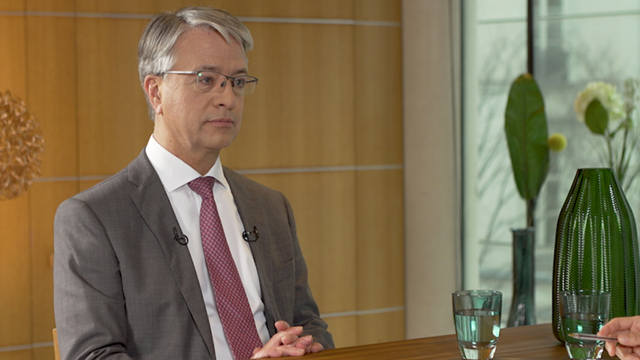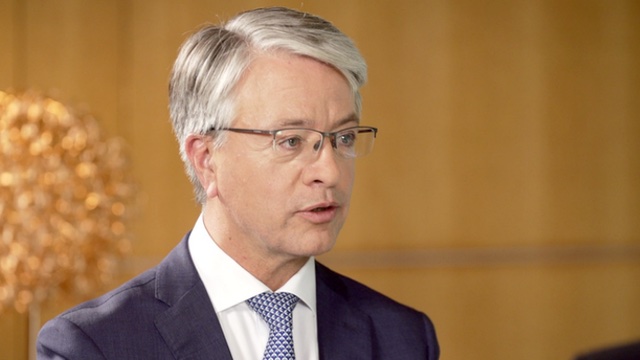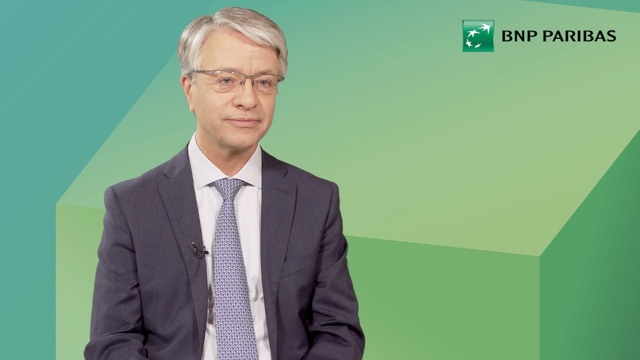EuroBusiness Media (EBM): BNP Paribas, one of the Europe’s largest banks, reports earnings for the first-quarter of 2010. Baudouin Prot, welcome. You are the CEO of BNP Paribas. What are your comments on the Group’s performance in the first-quarter?
Baudouin Prot (BP): These results are a true reflection of the Group’s new dimension. Despite a very high comparison base in the first quarter of 2009 due to exceptional CIB revenues, the Group’s top line was up 22 percent to 11.5 billion euros, and even flat at constant scope - that is to say including BNP Paribas Fortis in both reference quarters.
Cost control remains the trademark of BNP Paribas, with operating expenses declining by 3 percent at constant scope. This resulted in a positive jaws effect of 3.5 points and growth in pre-provision income of 5 percent. After a fall of 45 percent in the cost of risk at constant scope, pre-tax income increased by more than half to 3.8 billion euros.
Net profit therefore reached 2.3 billion euros, a result commensurate with the Group’s new dimension and its strong sales and marketing drive. The Group’s earnings per share grew by 20% compared to the first quarter of 2009, despite the full impact of the shares issued last October.
As a result, the Tier 1 ratio reached 10.5 percent, a very high level indeed.
EBM: In French retail, what is the momentum in terms of volumes today? What is the outlook for margins in the context of an expected interest rate hike?
BP: Customer loans continued to demonstrate good momentum, with a healthy growth of 3.4 percent. Household mortgages did really well, rising by 6.5 percent, and investment loans to corporates posted robust growth of 3.1 percent. Turning to deposits, growth was solid, at 8 percent for non interest-bearing sight deposits and 6.6 percent for savings accounts. Deposits at market rates did indeed drop, but this does not affect the net interest income, and it is even feeding growth in life insurance and other deposits. We do not think that in the current environment a rate hike by the ECB is likely any time soon, unless we face a sharp economic recovery, which is not our base scenario. However, long term rates could indeed rise, leading to a steeper yield curve, and this scenario is favourable for deposit spreads and ultimately for net interest margins.
EBM: You are disclosing the results of your Belgian & Luxembourg retail banking entities separately for the 1st time. What is your target in terms of jaws effect & cost income?
BP: BeLux Retail Banking, as this new business unit is called, delivered a solid performance in the first quarter of this year, with a pre-tax income of 235 million euros. Even though the population of BeLux is less than a fifth of the French population, thanks to our higher market share combined with higher GDPs per capita, BeLux Retail Banking is nearly half French Retail Banking in terms of client numbers, revenues, allocated equity and pre-tax income. It is therefore a major addition to the Group and a quantum leap in the development of retail banking in Europe, which is at the core of the Group’s strategy. On a like-for-like basis, revenues grew by over 10 percent and costs by 2 percent – note that this positive jaws effect benefited from a low revenue base in the first quarter of 2009 and is therefore not sustainable. We are targeting a 3-point positive jaws effect for the whole of 2010, thanks to the return of a strong sales and marketing drive and cost synergies. This will drive down the cost income ratio, with a view to closing the gap with the French Retail Banking’s cost income ratio in the medium term.
EBM: How is the integration of Fortis progressing?
BP: The integration of Fortis is a major project that involves almost all business units of BNP Paribas and brings a new dimension to them. In addition to a major breakthrough in Retail Banking, it is also a transforming deal for Investment Solutions and a significant add-on for the CIB platform. The Group is now a leader in all its businesses and has room to grow further and deliver cost synergies. More than 85% of over 1,100 plus projects related to the integration are underway. 42 million euros of additional synergies were delivered and booked in the first quarter, which will take the cumulative full year effect to 254 millions euros. This is in line with what was scheduled for this year in the integration plan.
EBM: Following the losses you experienced in Ukraine, what is the outlook for the cost of risk in your retail activities outside your domestic markets?
BP: When we published our 2009 results, we said that we were expecting the cost of risk for our Emerging Market Retail Banking activities to have peaked in 2009 and for it to trend downward from 2010. This was confirmed in the first quarter of this year. Ukraine accounts for the bulk of the cost of risk in the business unit now called “Europe Mediterranean”, and is driving the cost of risk down in the first quarter, to a little over half what it was in the same quarter last year. The crisis is certainly not over in Ukraine, but the environment is definitely improving in this country, especially after the presidential election.
EBM: US banks have been reporting an improvement in credit quality in the US. Are you seeing this at BancWest? Does this allow you to confirm a positive contribution by BancWest to the Group's results this year?
BP: Yes, BancWest experienced a decline in loan delinquencies across almost all lending segments in the first quarter of this year compared to the fourth quarter of 2009, and a stabilisation of doubtful loans. Overall the credit quality is stabilising. Combined with lower impairments on the investment portfolio, this helped BancWest return to profits in the first quarter. This should be confirmed over the full year, even though we are at a very early stage of the economic recovery in the US.
EBM: What are your plans for developing your asset management business, in the context of this business line’s recovery, and at a time when the industry is consolidating, as illustrated by the recent creation of Amundi?
BP: First of all, let me remind you that our asset management business does not need to recover as it has never posted negative results.
The integration of BNPP Investment Partners and Fortis Investments is a transforming transaction leading to the creation of a strong international player in Asset Management. It enables BNP Paribas to offer its products and investment solutions across several European markets while significantly strengthening its international positioning.
To develop our business we will of course capitalize on our European domestic retail networks and continue to promote cross selling of our investment products while developing external distribution through third party networks.
We will also work at improving our relationships with institutional investors with an improved segmentation of our offer. In this area, we are already among the leaders with a base of 1,700 institutional clients in 70 countries.
In Asia and emerging markets we will continue to invest directly and through our existing joint ventures like Shinhan in Korea and Fortis Haitong, now called HFT Investment Management, in China.
EBM: In your CIB division, you were able to repeat the very strong performance achieved in the first quarter of 2009 in a more “normalised” environment. How did you do it? Is this level of revenues sustainable?
BP : As we clearly highlighted, first quarter 2009 revenues were exceptional, driven by record client volumes, widest bid/offer spreads ever and a sharp tightening of credit spreads. Again in the first quarter of 2010, CIB posted a very high level of revenues at 3.75 billion euros. This very good performance was achieved thanks to very strong client activity from both issuers and investors in addition to the contribution of the former BNP Paribas Fortis activities. While Fixed Income posted strong revenues at 1.87 billion euros, Equity Derivatives delivered its highest ever quarterly revenues at 845 million euros. Beyond Capital Market activities, the Financing Businesses represent a recurrent and growing client revenue base, which totalled more than 1 billion euros in the first quarter. Given that the business model of our CIB division is characterised by a diversified business mix and a client centric approach, its performance depends on client appetite.
EBM: Regarding the new banking regulations under discussion, you’ve stated that European banks should not be forced to ‘run with lead shoes’ against their US or Asian counterparts. What new rules are you most in disagreement with, those regarding funding requirements, or those regarding capital requirements, or did you mean something else ? Please explain.
BP: First of all, I would like to reiterate our support for the actions of the G20 aimed at strengthening financial stability and learning from the crisis, by setting up efficient banking supervision, provided that it is on a level playing field. However, new standards for both capital and liquidity should have the right calibration. If not, it will hit the economy by reducing banks’ lending capacity especially at a time when Central banks are about to implement their exit strategies, after having provided strong support to the money market throughout the crisis, and at a time when governments are obliged to lower their budget deficits.
EBM: The International Monetary Fund is proposing a new tax for banks. Is this a major issue for BNP Paribas or can you cope with it should such a tax come about?
BP: At a time when capital requirements will be raised and regulation reinforced, taxing banks is certainly not appropriate, as several central bank governors have already stated recently.
EBM: Given the ongoing concerns over the Greek economy, what is your exposure to Greek sovereign debt and to Greek clients?
BP: As you know, BNP Paribas has made a number of acquisitions in Europe over the past years but has not bought any bank in Greece. So BNP Paribas does not have any domestic exposure to Greece. Our exposure to Greek banks is negligible as well. Our exposure to corporates, which has been constantly reduced over the last 3 years, is very limited at 0.2% of total Group’s commitments. Today, it is around 3 billion euros, concentrated on global companies, particularly in the shipping sector, where assets guarantee the loans and where risk and activities do not rely on Greek economy indeed. Finally, BNP Paribas exposure to Greek sovereign debt is limited, compared to the Group’s size. It stands at around 5 billion euros or 0.4% of Group’s total commitments.
EBM: Baudouin Prot, CEO of BNP Paribas, thank you very much.
BP: You’re welcome.






